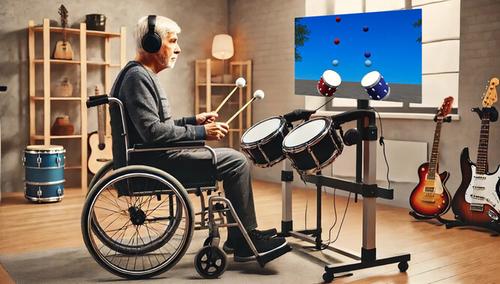当前位置:
X-MOL 学术
›
Ann. N. Y. Acad. Sci.
›
论文详情
Our official English website, www.x-mol.net, welcomes your
feedback! (Note: you will need to create a separate account there.)
Virtual reality–based music attention training for acquired brain injury: A randomized crossover study
Annals of the New York Academy of Sciences ( IF 4.1 ) Pub Date : 2024-10-30 , DOI: 10.1111/nyas.15249 Eunju Jeong, Yeajin Ham, Su Jeong Lee, Joon‐Ho Shin
Annals of the New York Academy of Sciences ( IF 4.1 ) Pub Date : 2024-10-30 , DOI: 10.1111/nyas.15249 Eunju Jeong, Yeajin Ham, Su Jeong Lee, Joon‐Ho Shin

|
This single‐blind randomized crossover study aimed to explore the effectiveness of virtual reality–based music attention training (VR‐MAT) on cognitive function and examine its potential as a cognitive assessment tool in people with acquired brain injury (ABI). Overall, 24 participants with cognitive impairment secondary to a first‐ever ABI underwent VR‐MAT and conventional cognitive training (CCT) 3 months after onset. This was performed in two 4‐week phases, over 8 weeks. During VR‐MAT, participants engaged in attention training through a four‐level virtual drumming program designed to enhance various attentional aspects. In contrast, during CCT, participants underwent structured conventional training, including card sorting and computerized training. Neuropsychological evaluations were performed preintervention, during the fourth and eighth weeks, and post‐intervention using tests to evaluate attention and executive function, along with global neuropsychological assessments. In the VR‐MAT group, significant differences were observed between pre‐ and post‐intervention in the trail making test‐black and white version B (p = 0.009) and version B–A (p = 0.018) and clinical dementia rating‐sum of boxes (p = 0.035). In the CCT group, significant differences were observed in spatial working memory (p = 0.005) and the mini‐mental state examination scores (p = 0.003). VR‐MAT is an effective cognitive intervention that is particularly beneficial for improving attention in people with ABI.
中文翻译:

基于虚拟现实的获得性脑损伤音乐注意力训练:一项随机交叉研究
这项单盲随机交叉研究旨在探索基于虚拟现实的音乐注意力训练 (VR-MAT) 对认知功能的有效性,并检查其作为获得性脑损伤 (ABI) 患者认知评估工具的潜力。总体而言,24 名继发于首次 ABI 的认知障碍参与者在发病 3 个月后接受了 VR-MAT 和常规认知训练 (CCT)。这分两个 4 周的阶段进行,为期 8 周。在 VR-MAT 期间,参与者通过一个四级虚拟击鼓计划进行注意力训练,旨在增强各种注意力方面。相比之下,在 CCT 期间,参与者接受了结构化的常规培训,包括卡片分类和计算机化培训。神经心理学评估在干预前、第 4 周和第 8 周进行,干预后使用测试评估注意力和执行功能,以及整体神经心理学评估。在 VR-MAT 组中,在试验制作测试黑白版本 B (p = 0.009) 和版本 B-A (p = 0.018) 和临床痴呆评分总和(p = 0.035)中观察到干预前后的显着差异。在 CCT 组中,观察到空间工作记忆 (p = 0.005) 和简易精神状态检查分数 (p = 0.003) 的显着差异。VR-MAT 是一种有效的认知干预,对提高 ABI 患者的注意力特别有益。
更新日期:2024-10-30
中文翻译:

基于虚拟现实的获得性脑损伤音乐注意力训练:一项随机交叉研究
这项单盲随机交叉研究旨在探索基于虚拟现实的音乐注意力训练 (VR-MAT) 对认知功能的有效性,并检查其作为获得性脑损伤 (ABI) 患者认知评估工具的潜力。总体而言,24 名继发于首次 ABI 的认知障碍参与者在发病 3 个月后接受了 VR-MAT 和常规认知训练 (CCT)。这分两个 4 周的阶段进行,为期 8 周。在 VR-MAT 期间,参与者通过一个四级虚拟击鼓计划进行注意力训练,旨在增强各种注意力方面。相比之下,在 CCT 期间,参与者接受了结构化的常规培训,包括卡片分类和计算机化培训。神经心理学评估在干预前、第 4 周和第 8 周进行,干预后使用测试评估注意力和执行功能,以及整体神经心理学评估。在 VR-MAT 组中,在试验制作测试黑白版本 B (p = 0.009) 和版本 B-A (p = 0.018) 和临床痴呆评分总和(p = 0.035)中观察到干预前后的显着差异。在 CCT 组中,观察到空间工作记忆 (p = 0.005) 和简易精神状态检查分数 (p = 0.003) 的显着差异。VR-MAT 是一种有效的认知干预,对提高 ABI 患者的注意力特别有益。


















































 京公网安备 11010802027423号
京公网安备 11010802027423号